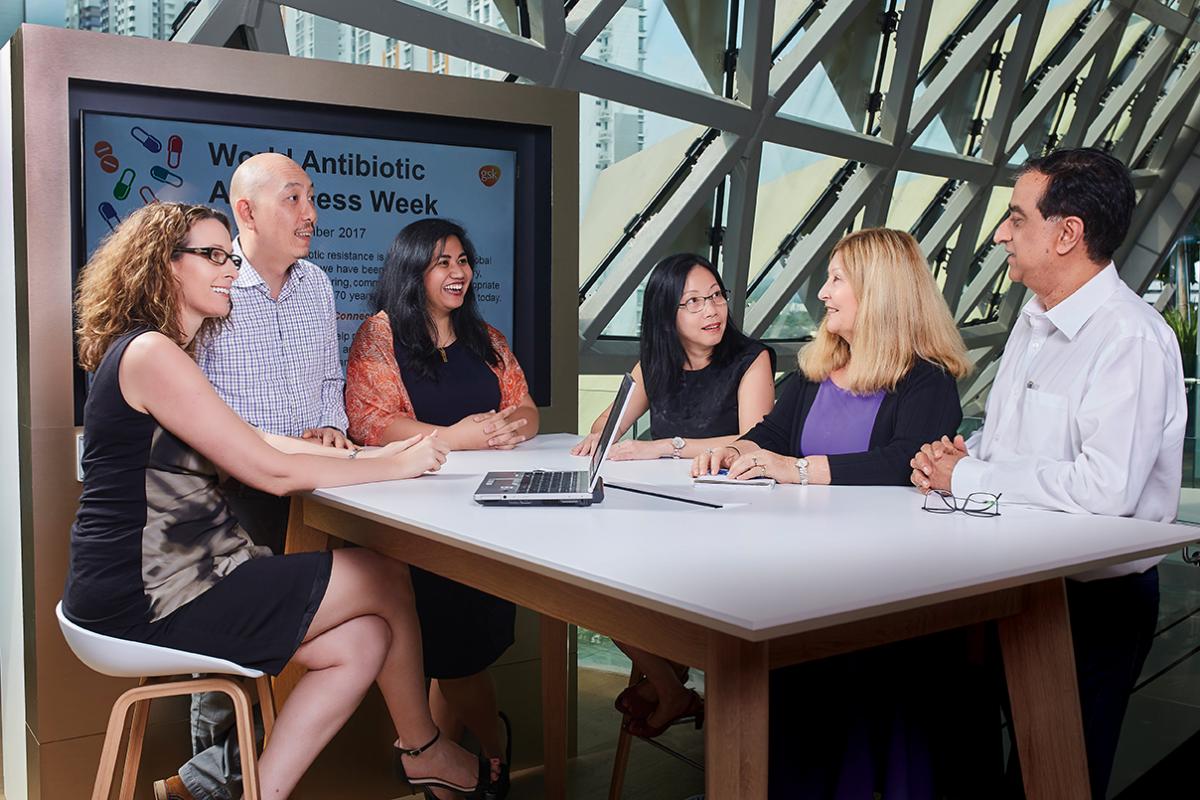An effective cure with GSK’s talent remedy

For a company as broad and complex as GlaxoSmithKline (GSK) – with three main business units and 34,000 employees across Asia alone – having a clear HR framework is how the pharmaceutical giant keeps its employees motivated, which in turn keeps its complex operations running smoothly.
Speaking with Bonita Lee (pictured below), GSK’s Vice President of HR for Pharmaceutical International, this is not immediately apparent, particularly because there are so many staff engagement and development programmes and initiatives available across an entity of this size.
But it soon becomes evident that there is a systematic method to all of that activity. All the different moving parts come together at the end to help the organisation achieve its three main objectives of engaging and developing people, creating a more flexible organisational culture, and building a resilient workforce.
AT A GLANCE
Number of employees (Asia-Pacific): 34,000
Size of HR Team: 60
Key HR Focus Areas:
- Corporate social responsibility
- Leadership development
- Learning and development
- Culture-building
- Health and wellness
Lee explains how these goals, first introduced three years ago, were largely influenced by the blurring of work and life, the overwhelming millennial factor, and the digitisation of work.
“We can’t afford to ignore these trends. We need to develop an environment that’s modern, inclusive, enriching, and purpose-driven. So a lot of activities are dove-tailed to these areas in order to attract and retain the best people,” says Lee.
Rebuilding culture
The catalyst for change, she notes, has been “GSK Asia House”, the company’s new Asia-Pacific headquarters in Singapore that was officially unveiled in October last year. The premises, which made HRM Magazine Asia’s inaugural “Most Effective Workspaces” list, brought together several teams that had been previously based in different parts of Singapore and the region.
“It was not until we physically came together that we felt the changes and the buzz of all the things we’ve been doing. There are a lot of elements in here that allow collaboration,” she shares, adding that HR had a huge part to play in the conceptualisation of the space.
But the one element that brings everything together, Lee stresses, is culture.
“The basics are already there. But if people don’t access those tools, then it still doesn’t get us where we want to be,” she explains.
This is why culture-building has become one of HR’s key priorities and it has been particularly evident in how the organisation has approached learning and development.
GSK uses the 70-20-10 learning and development model, but Lee says that for this to be truly effective, it is important that managers and their teams have regular, open dialogues. Individual employees also need to be proactive and take charge of their own career development.
In November last year, HR ran Grow @ GSK Asia, a one-day event that helped educate employees on the importance of leading their own development paths. The informational event also showcased how staff can engage their managers regularly to have conversations about their growth within the company.
It was also about breaking existing beliefs surrounding career development, and broadening individuals’ understanding of what a career looks like in 2018.
“In the East Asian context, people have the belief that ‘careers’ are built only if you are promoted,” says Lee. “But we’re trying to help people rewire their thinking that career building and development is about acquiring new experiences and not just about getting a better-sounding title.”
Sense of purpose
This focus on rebuilding culture can also be seen in how the drug manufacturer marries its corporate mission with its external activities.
As the sixth largest pharmaceutical organisation in the world, GSK prides itself on making its products available to as many people across the world as possible, regardless of their socio-economic status.
Lee says the company is well-aware of the industry’s controversial reputation among the general public, which is why being an accessible healthcare brand is one of GSK’s core missions today.

“Anyone who is a part of GSK has to believe in this mission. It’s very central to our DNA,” says Lee.
Providing this sense of purpose is also particularly key when it comes to engaging and retaining millennial employees, who the company has found respond best to having a cause.
In fact, the number one reason why most people join and stay with GSK, according to annual employee engagement surveys, is because they feel proud to be associated with a company that gives back to society.
Unsurprisingly, corporate social responsibility has become a key component of the overall organisational culture.
Two unique but equally impactful initiatives – Pulse and Orange Day – show how the company uses purpose-driven activities not only to give back to society, but also to engage and develop individuals within its workforce.
Pulse is a global, organisation-wide skills-based volunteering programme, where selected employees are paid to work with a non-profit organisation of their choice using their job expertise for a period of between three to six months.
Lee says there have been multiple benefits.
Not only do the communities receive much-needed assistance, the individuals also improve their own capabilities in the process. Typically working with an organisation that operates on a bare minimum of resources, they often then return to GSK with ideas for how to simplify processes.
“It changes the employees. To spend three to six months in a developing country, and with an organisation that is very stripped down – they get enriching experiences they have never had before, and come back very changed,” says Lee.
In Asia alone, there have been over 700 employees attached to some 120 charitable entities across 60 countries, since the Pulse programme started in 2008. Lee hopes even more employees will sign up in the future.
“It started with a lot of participation from the west, but in the last five to six years, more of us from Asia-Pacific have joined,” she says.
Orange Day, another philanthropic effort, is a day solely dedicated to giving back to the local community. All employees can choose one day in a year to support a cause. This could range from food distribution to the poor, or spending a day with the intellectually disabled.
The company also encourages employees to go beyond those two activities.
Lee shares the example of one Singapore employee who committed to scaling Mount Kenya alongside 39 other colleagues from around the world, in a bid to raise money for the Save the Children partner foundation.
The employee was given a month’s paid leave to participate in the expedition.
“There are lots of opportunities like that at GSK,” Lee says. “They enable people to do more and bring that learning back to GSK so that they can become better themselves.”
Market exposure with a cause
Another HR priority has been that of leadership development. But what GSK does differently is that it deliberately integrates leadership development with its corporate social responsibility and purpose-driven culture.
Lee says the decision to rethink its regional leadership development approach also happened largely in tandem with the development of the GSK Asia House.
One of the first things the HR team did was to interview managers both inside and outside the company, so as to figure out what its leadership strengths and weaknesses are.
Four broad areas for improvement emerged: Building cultural intelligence for a diverse region like Asia; managing complexities and ambiguities; being willing to take risks; and engaging stakeholders.
There was also the issue of giving individuals with limited market exposure and experience the opportunity to take on more senior roles.
In line with these findings, the Asia HR team introduced the Asian Leadership Programme for Emerging Leaders Forum.
As part of the programme, the general managers of each market sponsor around 30 mid-career talents from between 12 and 15 countries every year. Each business head has to sponsor at least one individual from a different market.
Each of the selected employees is then given a challenge from a non-profit or non-governmental organisation, for which they have to come up with solutions and recommendations. In 2016, the challenge was to increase awareness for bone marrow disease, while last year the programme supported the Special Olympics.
The role of the general managers is to coach the individuals through the team challenges, including on how to craft the content of their presentations, how to link their ideas together, and how to make good recommendations.
As a result of the programme, Lee says talent mobility across the different markets has increased.
“When you move talent, it’s very expensive because you don’t know if that talent speaks your language or understands your culture, so you will naturally think twice about paying to bring someone across,” she explains. “But when you have coached the person and believe in them, it’s so much easier.”
All parties involved also become more culturally intelligent, while the talent themselves gain the market experience they need to get to the next level.
“It’s a risky move for some of these individuals, but it’s the ultimate career accelerator,” says Lee.
But the biggest win is still with regards to how the company has been able to meaningfully help the communities in need at such a massive scale.
“The core component of that programme essentially is these organisations having a problem, and they don’t have anyone to turn to. These 30-odd talented individuals come together and think about how we can solve their problems.
“It has nothing to do with GSK and is completely purpose-driven,” says Lee.
The programme has been so successful that other regions are looking to replicate it, a feat in itself.
“The scope of this programme is likely to be widened because it has worked in Asia and the other parts of the world have seen how it has worked. It’s very rare for a programme to be pushed out from Asia to the rest of the world,” says Lee.
The height of philanthropy

In March last year, Alena Koshcheeva, Brand Manager for Adult Vaccines Portfolio at GSK Singapore (pictured), along with 39 other GSK employees, went on a mountain trekking mission to help raise money for underprivileged Kenyan children.
The initiative, organised in support of the Save the Children foundation, saw the volunteers scale up Mount Kenya in freezing weather. It raised over S$500,000 in total.
Koshcheeva says this was the perfect opportunity for her to contribute to a good cause.
“This partnership is both an inspiration and an important example of the way the private and NGO sectors can collaborate for the benefit of the poorest people in the world,” she said.
“It is amazing to look back and see all the positive changes that have happened thanks to the people around me who have supported me with this initiative for a good cause.”



